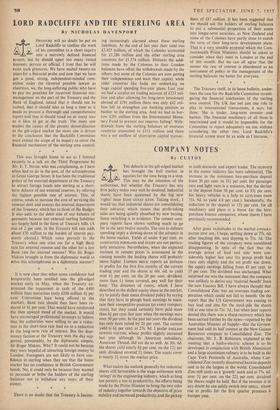LORD RADCLIFFE AND THE STERLING AREA
By NICHOLAS DAVENPORT PRESSURE will no doubt be put on
Lord Radcliffe to confine the work
of his committee to a short inquiry :AU •:,11. into a narrowly defined financial system, lest he should upset too many vested interests, private or official. I trust that he will resist such pressures. We have waited twenty-six years for a financial probe and now that we have got a good, strong, independent-minded com- mittee under the cleverest possible lawyer as chairman, we, the long-suffering public who have to pay the penalties for recurrent financial mis- management on the part of the Treasury and the Bank of England, intend that it should not be rushed, that it should take as long a time as it needs to present a thorough and comprehensive report and that it should tread on as many toes as it likes to get at the truth. The more one studies the causes of the present demoralisation in the gilt-edged market the more one is driven to the conclusion that the Radcliffe Committee must extend the scope of its inquiry to cover the financial mechanism of the sterling area control.
This was brought home to me as I listened recently to a talk on the Third Programme by Mr. E. T. Nevin, who was complaining, as I have often had to do in the past, of the schizophrenia in Great George Street. It has been the traditional policy of the external department of the Treasury to attract foreign funds into sterling as a short- term defence of our external reserves, by offering the highest possible rate of interest.. This, of course, tends to increase the cost of servicing the internal debt and annoys the internal department of the Treasury, which has to think of the Budget. It also adds to the debit side of our balance of payments because our external sterling liabilities arc largely held in the form of Treasury bills. (A rise of 2 per cent. in the Treasury bill rate adds about £50 million to the burden of interest pay- ments abroad.) Which voice prevails in the Treasury when one cries out for a high Bank rate for external reasons and the other for a low Bank rate for internal reasons? Was Sir Roger Makins brought in from the diplomatic world to solve this schizophrenia in a diplomatic manner?
* * * It is now clear that when some confidence had temporarily been instilled into the gilt-edged market early in May, when the Treasury an- nounced the repayment in cash of the £400 million June maturities (only £100 million 44 per cent. Conversion loan' being offered • to the market), Bank rate should then have been re- duced to 44 per cent. That would have reinforced the then upward trend of the market. It would have encouraged professional investors to believe that the authorities were willing to see a reduc- tion in the short-time rate lead on to a reduction in the long-term rate of interest. But the dear- money faction at the Treasury won the day sup- ported, presumably, by the diplomatic umpire, Sir Roger Makins. Why? It could not be because they were hopeful. of attracting foreign money to London. Foreigners are not likely to have con- fidence in sterling when they see that the home market has no confidence in British Government bonds. No, it could only be because they wanted to persuade or bribe the holders of the sterling balances not to withdraw any more of their money. * * *
There is no doubt that the Treasury is becom-
ing increasingly alarmed about these sterling liabilities. At the end of last year their total was £3,425 million, of which the Colonies accounted for £1,286 million and the other sterling area countries for £1,574 million. Hitherto the addi- tions made by the Colonies .to their London balances have offset the withdrawals made by the others; but some of the Colonies are now getting their independence and want their capital, while older countries like India are embarking on huge capital spending five-year plans. Last year we had a surplus on trading account of £233 mil- lion and after allowing for long-term investment abroad of £191 million there was only £42 mil- lion left to strengthen our banking position as banker to the sterling area. And we had to bor- row £201 million from the International Mone- tary Fund to prevent our reserves falling! With- drawals from the sterling balances of overseas countries amounted to £151 million and there was a net outflow of short-term capital transac- tions of £87 million. It has been suggested that we should ask the holders of sterling balances to put a substantial proportion of their assets into longer-term securities, as New Zealand and some of the Colonies have partly done to match the term of their long-term development plans. That is a very sensible proposal which the Com- monwealth Prime 'Ministers should be asked to consider when they meet in London at the end of this month. But we can all agree that the sooner the rate of interest is abandoned as an instrument of policy in the management of the sterling balances the better for everyone.
The Treasury itself, in its latest bulletin, under- lines the case for the Radcliffe Committee investi- gating the financial mechanism of the sterling area control. The UK has not just one role to play in international transactions, it says, but three. She is trader, long-term investor . and banker. The financial machinery of all three is intertwined and it would be impossible for the Committee to report adequately on one without considering the other two. Lord Radcliffe's financial screen must be as wide as Cinerama.


































 Previous page
Previous page